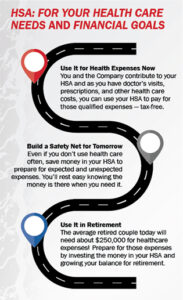NOTE: You are only eligible to open a Health Savings Account (HSA) if you are a full-time or QEC eligible part-time employee enrolled in the Health Savings Plan, the Company’s high deductible medical plan option.
The Health Savings Account (HSA) is offered through Optum Bank to employees who enroll in the Health Savings Plan. Remember, you must set your weekly contribution amounts when you enroll, but you may also increase or decrease your weekly contribution amounts any time throughout the year in Workday. If you choose to enroll in the Health Savings Plan, you will receive a welcome kit and debit card from Optum Bank to pay for any out-of-pocket expenses.

Company HSA Contributions
The Company will contribute $500 for individual coverage and $1,000 for family coverage on the day medical benefits go into effect. NOTE: If you change your Health Savings Plan enrollment from individual to family or family to individual based on a qualifying event in the middle of the plan year, the Company’s contributions will remain at the plan coverage level at which you initially enrolled.
Your 2024 Pretax HSA Contributions
In addition to the deposits the Company makes, you are able to contribute money on a pre-tax basis from your paycheck to your HSA up to the combined annual IRS limit of $4,150 for individual coverage and $8,300 for family coverage. (These limits include the Company’s contribution of $500 for individual and $1,000 for family.) If you are age 55 or older, you may contribute up to an additional $1,000 per year.
Your 2025 Pretax HSA Contributions
In addition to the deposits the Company makes, you are able to contribute money on a pre-tax basis from your paycheck to your HSA up to the combined annual IRS limit of $4,300 for individual coverage and $8,550 for family coverage. (These limits include the Company’s contribution of $500 for individual and $1,000 for family.) If you are age 55 or older, you may contribute up to an additional $1,000 per year.
HSA Benefit: Triple Tax Advantage:
- Your contributions are made pre-tax, decreasing your overall taxable income.
- Your account grows tax free through investment or interest payments.
- Money is withdrawn tax free when you pay for qualified health care expenses.
Nearly 80% of plan members spent $2,000 or less in medical expenses last year. If you are in that group, the Health Savings Plan and the financial advantages of an HSA may be your best choice.
Using your Health Savings Account
- Take advantage of the Health Savings Plan’s lower premiums and contribute the money you save on premiums into your HSA! Your HSA is a tax-free savings account which you own and the money carries over from year to year.
- Use your HSA to pay for visits to your physician or when you pick up a prescription, or other expenses such as, eye glasses, orthodontia, and chiropractic care. See other qualified expenses at www.optumbank.com.
- If you don’t use the money in your HSA, it will be there for unexpected medical expenses or additional retirement funds.
- Inviting and easy … QUICK VIDEOS: Want to learn more about how to use your HSA and invest your account funds? There are a multitude of short videos and other helpful resources from Optum that quickly tell you what you need to know: www.optum.com/en/library/health-finances
- If you have questions about your account, or want to learn more about your choices for using your HSA, contact Optum Bank’s customer service at 1-844-326-7967 or www.optumbank.com.
HSA Eligibility and Restrictions: To be eligible to contribute to the HSA, you cannot have other non-HSA compatible coverage (i.e. Traditional PPO, HMO, or HRA plans, including non-HSA compatible coverage through a spouse’s employer, your spouse enrolled in a non-limited FSA, Medicare, Medicaid, or Tricare), or have someone claim you as a dependent for tax purposes. If this is the case, you can still elect the Health Savings Plan for the lower premium contribution, but you may not receive the employer contributions or make your own pre-tax contributions to the HSA. If you are also enrolling in the Flexible Spending Account, you are limited to using your FSA only for vision and dental expenses for you and your family.
Additional HSA Information:
